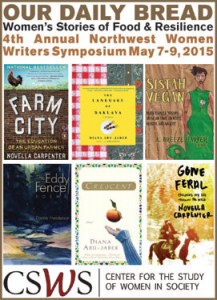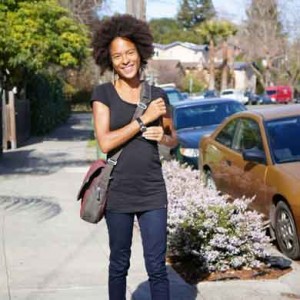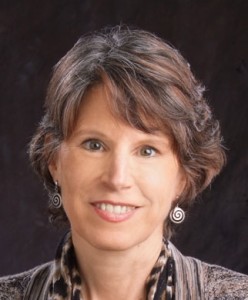 Eugene Public Library
Eugene Public Library
100 W. 10th St. (10th and Olive)
Eugene, OR
For a full listing of panels, workshops and other events, go to: http://csws.uoregon.edu/events-2/2014-nwws/csws-northwest-women-writers-symposium-2015/
The fourth annual CSWS Northwest Women Writers Symposium “Our Daily Bread: Women’s Stories of Food and Resilience,” will be held Thursday May 7, 2015, through Saturday May 9, 2015. Diana Abu-Jaber (Crescent; The Language of Baklava; Birds of Paradise) is the keynote author and will be joined by writers Novella Carpenter (Farm City: The Education of an Urban Farmer); scholar, activist, social justice novelist, editor Breeze Harper (Sistah Vegan; Scars); poet Donna Henderson (The Eddy Fence), and others.
This theme opens conversations about the sensuality of food; food and culture; food shortages; hunger and poverty; health and eating disorders; climate change; misuse of natural resources; environmental racism; food distribution; genetic manipulation of seeds; and preparation and growing of food. Food is our daily bread, but in the practice of writing, what else feeds us? “Our Daily Bread” is a rich theme that will open the door to fruitful discussions of craft, creativity, humanity, gender, and community.
Sponsored by the UO Center for the Study of Women in Society. Cosponsors include Eugene Public Library; Oregon Humanities Center; UO Division of Equity and Inclusion; the UO Departments of Women’s and Gender Studies, English, and Ethnic Studies; UO School of Journalism and Communication; University Health Center; UO Libraries; Wayne Morse Center for Law and Politics; and the ASUO Women’s Center.
Saturday Events
Saturday Events include one morning panel and four afternoon workshops, followed by a reading from bestselling author Novella Carpenter. Location: Downtown Eugene Public Library at 10th and Olive (100 W. 10th St.)
On Saturday, the symposium will convene at 9:30 a.m. at the downtown Eugene Public Library with a panel of our featured writers. The morning panel, to be held in the Bascom / Tykeson rooms, will include readings and discussion from the works of our panelists on the symposium theme, “Our Daily Bread: Women’s Stories of Food and Resilience.” Our moderator will guide the panelists with questions about process and discipline.
Panelists include:
- Diana Abu-Jaber, winner of a PEN Center Award for Literary Fiction, the American Book Award, and an Oregon Book Award, among other honors. She teaches at Portland State University and taught previously in the Creative Writing Program at the University of Oregon.
- Novella Carpenter, author of the best-selling memoir, Farm City: The Education of an Urban Farmer, and the recently published Gone Feral: Tracking My Dad Through the Wild. She studied food writing with Michael Pollan at UC Berkeley’s Graduate School of Journalism. Carpenter lives and farms near downtown Oakland. Her blog is Ghost Town Farm.
- Breeze Harper, editor of the anthology Sistah Vegan: Black Female Vegans Speak On Food, Identity, Health, and Society, and the author of the social justice novel Scars: A Black Lesbian Experience in Rural White New England (2014).
- Donna Henderson is the author of three collections of poems, including most recently The Eddy Fence, which was a finalist for the 2011 Oregon Book Award in poetry. She is a founding member of Airlie Press. Her poems, essays, reviews and song lyrics have appeared in a variety of magazines, anthologies, performance venues and recordings. A licensed clinical social worker, Donna maintains a psychotherapy practice in Maupin, Oregon, where she lives on the Deschutes River with her husband, Rich Sutliff.
Afternoon Workshops, 1:30 p.m. – 3:30 p.m. All Saturday afternoon workshops will be limited to 20 participants. Although all events are FREE & open to the public, starting April 14, you must pre-register for limited spaces in Saturday afternoon workshops by calling Eugene Public Library at 541-682-5450 (Press 2).
Workshops:
-
“Food beyond Foodie: Strengthening and Diversifying Food Writing for Publishing,” taught by Prof. Jennifer Burns Bright, columnist at Eugene Magazine and sole proprietor of the award-winning blog, Culinaria Eugenius. She moonlights as a food writer while teaching literature and food studies at the University of Oregon, writing about anything from Dutch pickles for NPR to Russian dumplings for AAA’s Via magazine. Workshop Description: Blogs and magazine writing tend to present food as conservative, traditional, and overly sweet. We will explore techniques to make your own individuality heard in its grumpy, queer, unsavory, messy, aged, or just plain weird glory. We’ll seek to strengthen your critical voice, define your own taste, and attract audiences with more diverse lives or particular interests, all the while taking inspiration from unconventional food writers who broke the mold.
-
This workshop is now full. MEMOIR—“Tapping the Apocalypse: Writing About Your Turning Points,” taught by Novella Carpenter. Workshop Description: “We’ve all had horrible experiences that have shaped our lives–destroying some aspect of ourselves, allowing a new self to emerge. For this reason, many of the best moments in memoirs happen when something terrible happens to the narrator. This workshop will tease out these moments, giving advice on pacing, building scene and character, and cultivating a strong narrative voice.” Workshop leader Novella Carpenter is the author of the best-selling memoir, Farm City: The Education of an Urban Farmer, and the recently published Gone Feral: Tracking My Dad Through the Wild. She studied food writing with Michael Pollan at UC Berkeley’s Graduate School of Journalism. Her blog is Ghost Town Farm.
-
Narrating Racial [In]Justice Through Critical Food Writing, taught by Dr. Breeze Harper. Breeze Harper edited the anthology Sistah Vegan: Black Female Vegans Speak On Food, Identity, Health, and Society and is the author of the social justice novel Scars: A Black Lesbian Experience in Rural White New England (2014). Her blog is The Sistah Vegan Project. Workshop Description: In this workshop, participants will use food writing to explore their own personal experiences with racial injustice as well as anti-racism activism. The workshop is an outlet for those who love critical food writing/reading and have experienced the frustration and pain of being survivors of racism and/or are anti-racist activists. Dr. Breeze Harper is the editor of the anthology Sistah Vegan: Black Female Vegans Speak On Food, Identity, Health, and Society, and the author of the social justice novel Scars: A Black Lesbian Experience in Rural White New England (2014).
-
This workshop is now full. POETRY—“Taste and See: generating poetry by way of the senses,” taught by Donna Henderson, MSW, MFA. Henderson is the author of three collections of poems, including Transparent Woman (1997) and The Eddy Fence (2009), both of which were Oregon Book Award finalists. She is a founding member of Airlie Press, and is the vocalist and leader of Chuvarada, a jazz and latin music band. She sometimes teaches poetry and/or counseling at area universities. Workshop Description: “Because language (unlike, paint, sound, movement and other expressive-art media) is inherently meaningful, it is tempting to enter the practice of poetry at the level of meaning; to use language to describe an image, or to convey an emotion or idea. But the language of poetry rises out of, and in turn touches us most directly, at the level of the body: in our encounters with language as a sensual experience first of all. At its most profound, language tastes, it sings! Syllables have sensual qualities that we taste through speech, and sounds that enchant the ear. The development of language itself—in cultures and individuals—begins at this level, and meaning rises from there. In this workshop, we will use a set of prompts designed to help us enter language the way many cooks work with foodstuffs: at the level of its sensual qualities. Bring your writing media of choice (paper, pencils, electronic devices), and “come hungry,” expecting to be surprised—and hopefully even delighted—by what we generate, discover and compose. This workshop is appropriate for both beginning and experienced poets.”





